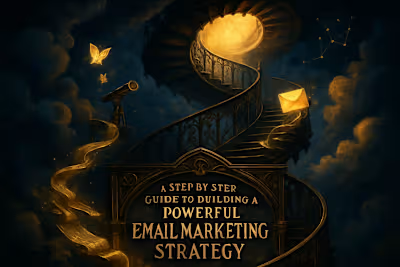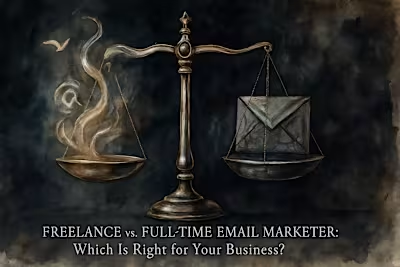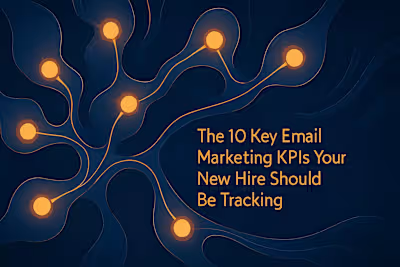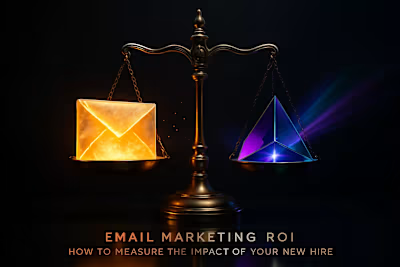The Cost to Hire an Email Marketer: 2025 Salary and Rate Guide
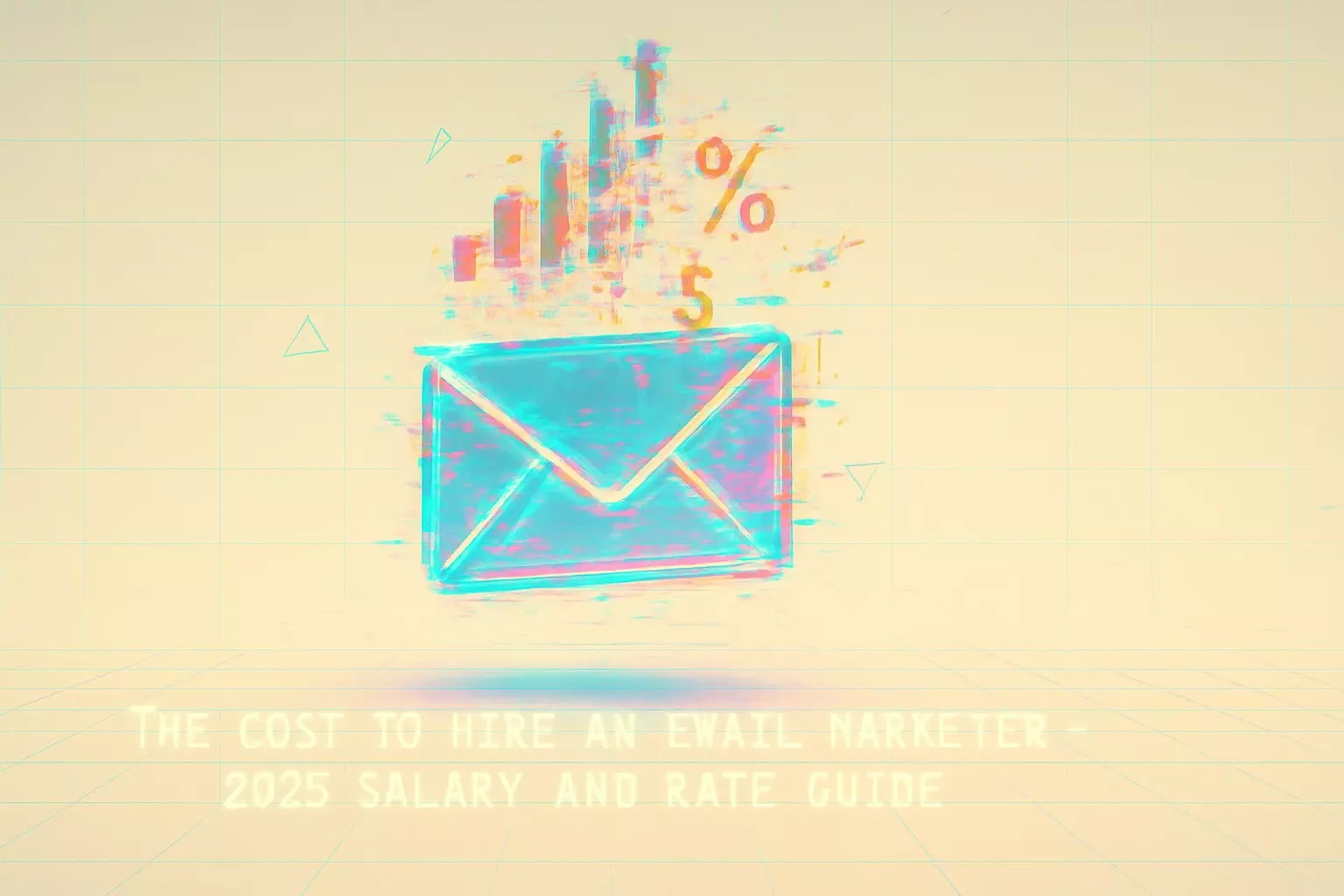
The Cost to Hire an Email Marketer: 2025 Salary and Rate Guide
Average Salaries for Full-Time Email Marketers (US)
Entry-Level Email Marketing Specialist (0-2 years experience)
Mid-Level Email Marketing Manager (3-5 years experience)
Senior Email Marketing Manager / Director (5+ years experience)
Typical Rates for Freelance Email Marketers (US)
Hourly Rates
Project-Based Pricing
Retainer Agreements
Factors That Influence the Cost of Hiring
Experience and Specialization
Geographic Location
Scope of Responsibilities
Company Size and Stage
Making the Right Hiring Decision
References
The Cost to Hire an Email Marketer: 2025 Salary and Rate Guide
Understanding the cost to hire an email marketer is a critical step in planning your marketing budget. Whether you're looking for a full-time employee or a freelancer, compensation can vary widely based on experience, location, and the scope of the role. This guide provides an overview of typical salary ranges and freelance rates for 2025 to help you make an informed decision.
Before you hire, it's also important to know which email marketing tools they should be familiar with. The right technical skills can make a huge difference in what you'll need to pay and the value you'll receive in return.
Average Salaries for Full-Time Email Marketers (US)
Full-time salaries are influenced by factors like experience level, responsibilities, industry, and geographic location. The following are general salary bands based on recent data.
When you're budgeting for a full-time email marketer, you need to think beyond just the base salary. Benefits, bonuses, and other perks can add 20-30% to your total cost. Let's break down what you can expect at each level.
Entry-Level Email Marketing Specialist (0-2 years experience)
An entry-level specialist is typically focused on execution-heavy tasks like building emails, managing lists, and basic reporting. Their salary reflects their developing skill set.
You can expect to pay between $40,000 and $55,000 annually for someone just starting out. These professionals handle the day-to-day tasks that keep your email program running. They'll create campaigns using templates, update subscriber lists, and pull basic performance reports.
What they bring to the table is enthusiasm and fresh perspectives. They're often up-to-date with the latest trends and eager to prove themselves. While they might need guidance on strategy, they're perfect for businesses that have established processes and need someone to execute them reliably.
Entry-level specialists typically handle tasks like:
Building and scheduling email campaigns
Managing subscriber lists and segmentation
Creating basic A/B tests
Monitoring campaign performance
Assisting with email design and copywriting
Keep in mind that at this level, you'll need to invest time in training and mentorship. But if you're willing to develop talent, hiring at this level can be incredibly cost-effective in the long run.
Mid-Level Email Marketing Manager (3-5 years experience)
A manager takes on more strategic responsibilities, including campaign planning, automation, A/B testing, and potentially managing junior staff. Their compensation reflects this increased ownership.
The salary range for mid-level managers typically falls between $65,000 and $85,000 per year. At this level, you're paying for someone who can think strategically about your email program while still handling execution when needed.
These professionals understand how email fits into your broader marketing strategy. They can develop campaign calendars, create sophisticated automation workflows, and dive deep into analytics to optimize performance. They're also comfortable presenting results to stakeholders and making data-driven recommendations.
A mid-level manager brings valuable skills like:
Developing comprehensive email marketing strategies
Creating complex automation sequences
Advanced segmentation and personalization
Performance analysis and optimization
Cross-functional collaboration with sales and content teams
What makes this level particularly valuable is their ability to work independently. Give them your business goals, and they'll create an email strategy to support them. They understand best practices but also know when to break the rules for better results.
Senior Email Marketing Manager / Director (5+ years experience)
A senior role involves high-level strategy, team leadership, budget ownership, and a focus on driving significant business ROI through the email channel. This level commands the highest salary range.
Senior professionals typically earn between $90,000 and $130,000 annually, with some positions in major markets or specialized industries reaching even higher. At this level, you're not just hiring an email expert – you're bringing on a revenue driver.
These leaders think about email marketing as a profit center. They understand customer lifetime value, can build predictive models, and know how to scale programs efficiently. They're comfortable managing teams, vendor relationships, and significant budgets.
Senior-level responsibilities often include:
Owning email channel revenue targets
Leading and developing marketing teams
Managing vendor relationships and technology stacks
Creating long-term strategic roadmaps
Driving innovation and testing new approaches
The investment in a senior professional pays off when you need someone who can transform your email program. They bring industry connections, proven playbooks, and the confidence to make bold decisions that drive growth.
Typical Rates for Freelance Email Marketers (US)
Freelancers offer a flexible pricing structure, typically charging by the hour or by the project. Their rates are also determined by their level of expertise and the complexity of the work.
The freelance market has exploded in recent years, giving businesses access to top talent without the commitment of a full-time hire. Understanding how freelancers price their services helps you budget effectively and find the right fit for your needs.
Hourly Rates
Freelance hourly rates can vary significantly. A junior freelancer might charge a lower rate for basic tasks, while a seasoned expert with a proven track record in a specific platform like Klaviyo or HubSpot will command a premium rate.
Here's what you can expect to pay:
Junior freelancers (0-2 years): $25-$50 per hour
Mid-level freelancers (3-5 years): $50-$100 per hour
Senior freelancers (5+ years): $100-$200+ per hour
The wide range reflects differences in expertise, specialization, and track record. A freelancer who specializes in e-commerce email marketing for fashion brands, for example, might charge more than a generalist – but they'll also deliver results faster.
When evaluating hourly rates, consider the total project cost. An experienced freelancer charging $150 per hour might complete a project in 10 hours that would take a junior freelancer 40 hours at $40 per hour. The math often favors expertise.
Project-Based Pricing
For well-defined projects, such as setting up a welcome email series or developing a set of new templates, freelancers may charge a flat project fee. This provides cost certainty for the business.
Common project-based pricing includes:
Email template design: $500-$2,500 per template
Welcome series setup: $1,500-$5,000
Full automation audit: $2,000-$7,500
Email program strategy: $3,000-$10,000
Project pricing works well when you have specific deliverables in mind. It eliminates the uncertainty of hourly billing and lets both parties focus on outcomes rather than time tracking.
The key to successful project-based work is clear scope definition. Be specific about what's included, what's not, and what constitutes completion. This prevents scope creep and ensures everyone's aligned on expectations.
Retainer Agreements
For ongoing work, many businesses opt for a monthly retainer. This secures a set number of hours or scope of work each month, providing consistency for both the freelancer and the client.
Typical retainer arrangements range from:
Part-time support (10-20 hours/month): $1,500-$4,000
Half-time support (40-80 hours/month): $4,000-$10,000
Near full-time support (80+ hours/month): $8,000-$20,000+
Retainers offer several advantages. You get priority access to your freelancer's time, consistent support, and often a slight discount compared to hourly rates. For the freelancer, it provides predictable income, which many are willing to exchange for a lower effective rate.
The best retainer relationships feel like having a part-time team member. Your freelancer learns your business, understands your goals, and can work more independently over time. This arrangement works particularly well for businesses that need ongoing support but can't justify a full-time hire.
Factors That Influence the Cost of Hiring
Several key variables can affect the salary or rates you can expect to pay. Understanding these will help you set a realistic budget.
The email marketing talent market is more complex than ever. Remote work has opened up new possibilities, while specialization has created distinct pricing tiers. Let's explore the factors that will impact your hiring costs.
Experience and Specialization
Marketers with deep expertise in high-demand areas, such as marketing automation, e-commerce strategy, or specific industry verticals, will cost more than generalists.
Specialization commands a premium because it delivers faster results. An email marketer who's spent five years working exclusively with SaaS companies understands your customer journey, knows which metrics matter, and can implement proven strategies from day one.
High-value specializations include:
E-commerce email marketing (especially for Shopify or specific platforms)
B2B lead nurturing and sales enablement
Marketing automation platform expertise (Marketo, Pardot, HubSpot)
Industry-specific knowledge (healthcare, finance, education)
Technical skills (HTML/CSS, SQL, API integrations)
The premium for specialization can be 20-50% above generalist rates. But consider this: a specialist might achieve in three months what would take a generalist six months to figure out. When time-to-value matters, specialization is worth the investment.
Geographic Location
Salaries and rates are typically higher in major metropolitan areas with a higher cost of living compared to smaller cities or rural areas. However, the rise of remote work is starting to level this field.
Traditional salary differences by location:
San Francisco/New York: 20-40% above national average
Major metros (Chicago, LA, Boston): 10-20% above average
Mid-size cities: At or slightly below average
Rural areas: 10-20% below average
But here's where it gets interesting. Remote work has scrambled these traditional patterns. You might find a world-class email marketer in Kansas willing to work for less than someone mediocre in Manhattan. Or you might discover that top talent everywhere now commands Silicon Valley rates.
The smart approach? Cast a wide geographic net but be prepared to pay for quality regardless of location. The best talent knows their worth and has options. Focus on value rather than finding the cheapest option.
Scope of Responsibilities
A role that involves managing a team, owning a budget, and being responsible for channel ROI will have a higher salary than a purely execution-focused role.
Think of email marketing roles on a spectrum from tactical to strategic. Each step up the ladder adds responsibilities and compensation:
Tactical roles focus on:
Campaign execution
List management
Basic reporting
Template updates
Strategic roles include:
Revenue ownership
Team leadership
Vendor management
Cross-channel integration
Executive reporting
The jump from tactical to strategic can mean a 40-60% salary increase. But it's not just about paying more – it's about finding someone who can handle the pressure and complexity of strategic ownership.
When defining scope, be honest about what you need. Hiring someone strategic for a tactical role wastes money and talent. Hiring someone tactical for a strategic role sets everyone up for failure.
Company Size and Stage
Large, established enterprises may offer higher base salaries and more extensive benefits packages, while early-stage startups might offer a lower base salary but include equity as part of the compensation.
Different company stages attract different types of talent:
Startups often offer:
Lower base salaries (70-85% of market)
Equity compensation (0.1-1% for key hires)
Flexible work arrangements
High-impact opportunities
Rapid skill development
Mid-size companies typically provide:
Market-rate salaries
Standard benefits packages
Defined career paths
Work-life balance
Stable environment
Enterprises usually feature:
Above-market salaries (110-130% of average)
Comprehensive benefits
Structured advancement
Specialized roles
Brand prestige
Your company's stage influences not just what you can pay, but who you can attract. A startup might struggle to match enterprise salaries but can offer ownership and impact that appeals to entrepreneurial marketers.
Making the Right Hiring Decision
Choosing between full-time and freelance, junior and senior, specialist and generalist – these decisions shape your email marketing success. The key is matching your needs, budget, and growth plans to the right talent model.
Start by assessing your real needs. Do you need someone to execute a defined strategy, or create that strategy from scratch? Is email marketing core to your business, or a supporting channel? How much guidance can you provide versus needing someone fully autonomous?
Consider the total cost of employment. A $75,000 salary actually costs about $100,000 after benefits, taxes, and overhead. Freelancers might seem expensive hourly, but you only pay for productive time. Run the numbers based on your actual needs.
Think about your growth trajectory. If you're scaling rapidly, investing in senior talent now might save you from costly mistakes later. If you're testing email as a channel, starting with freelance support lets you validate before committing.
The email marketing landscape continues to evolve. New tools, changing regulations, and shifting consumer preferences mean you need someone who stays current. Whether full-time or freelance, prioritize continuous learners who adapt to change.
Finally, remember that great email marketers are in high demand. The best talent has options, so move quickly when you find the right fit. Be prepared to sell your opportunity as much as they're selling their skills.
Email marketing remains one of the highest ROI channels in digital marketing. Investing in the right talent – at the right price – sets you up for sustainable growth. Use this guide as your starting point, but let your specific needs and goals drive your final decision.
References
Like this project
Posted Jun 14, 2025
Budgeting to hire an email marketer? Explore our 2025 guide to average salaries for full-time employees and hourly rates for freelancers in the US.







